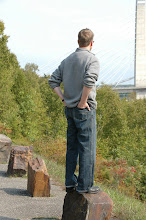Green Work
There is a lot of talk right now about how to "green" our home lives--from carbon-offsetting of car usage, to the food choices we make, to the cleaners we use, etc. But I suspect that you, like me, spend a large amount of your time not at home but at work (and in my case, I spend more time at work than at home). And so I often struggle with the question--how can I green my work life? It is an important question because I think that history shows us that people make very different decisions when they are part of larger organizations and institutions than when they are on their own or in a social context other than the work institution (it is easy to place the blame or fault for something you feel may be wrong on the institution and then disconnect yourself from being an actor in the situation: "Oh, this is the way we do business," "Its about the numbers," etc.)
Of course, if you are in a power position in an organization there are an immense number of of ways you can green your work: make green building choices; reduce product waste; educate your employees; increase efficiency and reduce waste (green = efficient = $$$ saved or lost). But most workers are in control of these decisions. What is there to do?
I look at my daily habits--are there things I do everyday that create unnecessary waste? Say buying a coffee every day on the way to work? If so, I try to find an alternative (i.e. I make my coffee every day and bring it in a thermos). Other ideas:
Of course, if you are in a power position in an organization there are an immense number of of ways you can green your work: make green building choices; reduce product waste; educate your employees; increase efficiency and reduce waste (green = efficient = $$$ saved or lost). But most workers are in control of these decisions. What is there to do?
I look at my daily habits--are there things I do everyday that create unnecessary waste? Say buying a coffee every day on the way to work? If so, I try to find an alternative (i.e. I make my coffee every day and bring it in a thermos). Other ideas:
- Waste. What am I throwing away every day? Just because I don't have to pay for the trash removal doesn't mean my garbage isn't accumulating somewhere.
- Avoid bottled water. Bottled water requires at least 2-3x the amount of water found in the bottle for the filtration process and in the process of creating the bottle itself. And then you have to do something with the bottle. Buy a water pitcher/filter pitcher and keep it at your desk. Saves ya money too.
- Turn off your computer. Plain and simple--it is a myth that leaving your computer on all the time is good for it. Turn it off every night.
- Optimize your computer's energy usage. Your computer (Mac or PC) has a Power Savings or Energy Savings setting. Turn it to optimize power usage or battery life. By default, your computer is set to optimize performance. Think of how much energy could be saved if everyone switch their computers to optimize energy esage (one estimate I saw recently was the switch from Windows XP to Windows Vista, where the energy saving options will be the default, will save $25B (that's billion) in energy).
- Stop printing. Especially emails. And always, always, always, preview what you are about to print so you only print the pages that you want.
- Buy Adobe Acrobat. With Adobe Acrobat (the program, not Adobe Acrobat Reader) you can create PDFs from any document. Want that Excel spreadsheet as a PDF? You can do it. Why is this important? Because Adobe Acrobat comes with annotation tools. So instead of printing out a document and marking it up on paper, you can do it all electronically.
- Carbon off-set your work travel. Some organizations do this already (I believe Bank of America carbon-offsets all their employees travels). There are many organizations that you can donate to that will invest in carbon-offset projects. I prefer to give to an organization like Nature Conservancy that preserves and conserves land--something that has a much broader (positive) environmental aspect than building, say, a wind farm. Or if you have land (I am of the landless masses of apartment dwellers), plant some trees (native species only!!!).
- Bring your food from home--how much waste is generated by take-out, delivery people, driving to a restaurant, etc?

